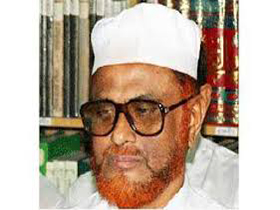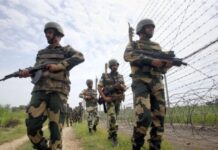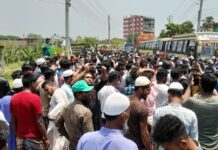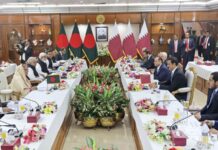A prosecution witness, whose captive father miraculously escaped alive with several bullet injuries, on Sunday accused ATM Azharul Islam, a Rangpur commander of 1971 Al Badr, of masterminding the plot of abduction, persecution and killing of 10 unarmed civilians during the Liberation War.
“My father, Dinesh Chandra Bhowmik, a homeopath, was abducted by the Pakistan occupation army in collaboration with the leaders of Jamaat-e-Islami and the activists of its student wing ICS, including accused ATM Azharul Islam, from our Babupara house in Rangpur town on March 27 in 1971,” recalled Rathish Chandra Bhowmik, an advocate, while making deposition before the International Crimes Tribunal-1 as PW-13.
The PW also said that his uncle, Shanti Chaki, who lived in a house on the road opposite to their house, was also abducted by the same group at the same time. Both of them were taken to Rangpur cantonment, he added.
“In the early hours on April 4, 1971, we heard heavy gunshots coming from the direction of Dakhiganj crematorium, only half a kilometre from our house,” Rathish told the tribunal.
“Immediately after the gun firings, a neighbour, Gopal Babu, rushed to our house and asked my uncle Manik Chandra Bhowmik to leave the house quickly,” he said. ”Accordingly, we hired two bullock carts and left the house Ajoddhapur village, a remote area in remote district.”
“After a month, we along with my mother and other family members had taken refuge at the Railway quarters of another uncle, Debu Chaki, in New Jalpaiguri, West Bengal, India. There we met our father who narrated the horrific event and how he escaped alive with several bullet injuries.
Referring to his father, the PW said that before carrying out brushfire on them, the perpetrators had tied their hands and legs of all the 11 captives, including his father, keeping them in a row.
“My father miraculously escaped alive with several bullet injuries as his body was behind the beam of the crematorium,” he said.
Referring to his father, Ratish further said the Pakistan occupation army and its cohorts, including leaders of Jamaat and ICS activists, left the scene thinking all the captives killed.
Among the victims, he mentioned the name of his maternal uncle, Shanti Chaki.
The PW indentified detained Azharul in the dock and later faced cross-examination by the defence counsel Abdus Sobhan Tarafder, which remained inconclusive.
On November 12, 2013, the tribunal framed charges against ATM Azharul Islam, a commander of 1971 Al Badr, for his involvement in crimes against humanity, including genocide, during the Liberation War, dismissing the discharge plea filed by the accused.
Also a leader of Jamaat-e-Islami, Azharul faces six counts of charges of crimes against humanity during the 1971 Liberation War like killing, abduction, confinement, torture, loot, arson, rape and genocide in Rangpur district.
A week after submitting the formal charge by the prosecution, the tribunal on July 25 took cognisance of the charge against the Jamaat-e-Islami assistant secretary general as it found a strong prima facie case against the accused under subsections 3(2) and 4(1) (2) of the International Crimes (Tribunals) Act 1973.
According to the prosecution case, Azharul, the then Islami Chhatra Sangha (ICS) president of Rangpur district unit, had been involved in the killing of more than 1,200 unarmed innocent civilians in Rangpur during the Liberation War in collaboration with the Pakistan occupation army and its auxiliary force like Al Badr.
It mentioned that Azharul Islam had played a key role in the killing of intellectuals, cultural personalities, physicians and lawyers in different areas of Rangpur during the 1971 war.
On August 22, 2012, police arrested Azharul from his Moghbazar house in the capital in connection with the war crimes case, hours after the tribunal issued a warrant for his arrest following a prosecution plea.
Source: UNBConnect










